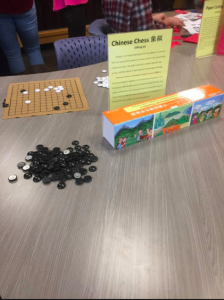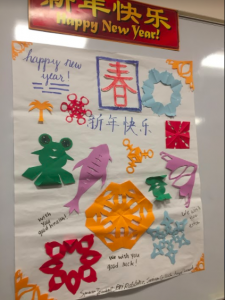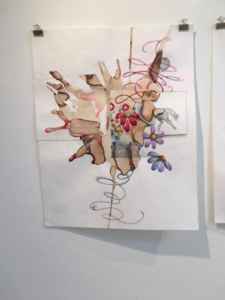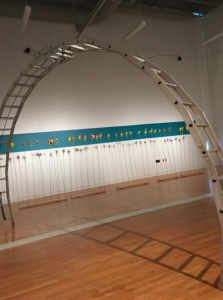Apr 27, 2018 | Feature |
By Nicole Stewart Staff Reporter
In mid-May, seniors will be marching across the stage receiving their diplomas for their hard work and then venturing off into post-college life. With this major change, UMF professors shared their advice to the class of 2018 on how to handle the ‘now what’ process students face.
Professor of Political Science, James Melcher, was excited to share his thoughts on what students should do after graduation. “Don’t feel like you’ve gotta have your career figured out the minute you walk off the stage. A lot of people today are going to work a lot of different jobs,” said Melcher. “Be flexible, explore and enjoy, take advantage, if you’re in that position of not being tied down. If you ever thought about wanting to travel, it’s easier to do now.”
Professor Melcher believes that students should savor the moment and not rush into everything at once. “Think about what you’re grateful for. That you went to school here, for the people that you met, for the things that you learned, for the experiences that you made. Even the bad experiences, maybe some of the bad experiences made you stronger, made you tougher, made you learn something.”
Assistant Professor of English, Misty Krueger, weighed in on what she wants students to know before leaving UMF. “I want them to know that they can always come back and talk to us,” said Krueger. “We don’t forget you, we care about you, and we’re ready to write you letters of recommendation, help you find jobs, and be there for you.”
Associate Professor of Anthropology, Nicole Kellett, believes that seniors should not be afraid to put themselves out there in the world after UMF and expand their horizons. “Try something different; try something new and maybe have a little time to chill out too,” said Kellett. “You’ve been working so hard for four or more years; have some time to maybe do something, explore different things that you’ve always wanted to explore.”
While graduation is a fun celebration, Professor Melcher expressed the grief he has after the event. “It’s really exciting, everybody’s all fired up and they’re all going off to have their parties and then I’m realizing, ‘Oh my God, all these seniors I really, really liked are going to be gone. How am I ever going to replace them?’” said Melcher.
All three professors urged that it is okay for seniors to not know what they’re doing after graduation, but to try to experience as much as they can. They noted that graduating is a new experience and it can be scary but UMF will always be here for seniors.
“It’s normal to be scared, but hopefully they [the students] had a lot of preparation here for going out into the world,” said Kellett. “Life definitely does not stop at UMF. There’s so much more out there. Look at this as a building block for many other opportunities down the road.”

Mar 2, 2018 | News |
By Nicole Stewart Staff Reporter

Chinese Chess (Photos by Nicole Stewart)
The UMF Office of Global Studies hosted a Chinese New Year Celebration in the recently renovated Fusion Center that brought together the community as they celebrated with music, food, and activities.
Participants were greeted with red envelopes filled with chocolate gold coins inside, meant to bring happiness and good luck. The celebration featured food such as pork and vegetable dumplings, Kung Pao and rice and activities including Chinese Chess, Chinese Paper Cutting, learning Mandarin, and practicing Chinese Calligraphy.
Haiyu Zheng, an international exchange student, explained that Chinese New Years is “the biggest celebration in China, because we don’t have any other celebrations.” Zheng further added that “this is a period of time where people, family members gather together and it is a celebration that lasts about two weeks, from the Chinese New Years Eve till the Lantern Festival.”
During Chinese New Year, each family has different celebrations and traditions.
“Basically we write Chinese calligraphies and we put them on the wall,” said Zheng. “We decorate our room with those things as a sign of good luck. Happiness, unity, all of those good things.”
Lynne Eustis, Assistant Director Of Global Studies said that UMF has hosted celebrations of the Chinese New Year since 2003. The planning of this event began in the fall.
“We started talking to our visiting Chinese professor,” said Eustis, who asked visiting Chinese students to talk about what activities they would like to see at the event.
Freshman Sara Szanty, in charge of the calligraphy station, believed that the community members and UMF students enjoyed practicing calligraphy and liked seeing the amount of people who attended.
“It’s great seeing people of different cultures coming together to enjoy the Chinese New Year,” said Szantyr. “I think it is a great way to experience a culture without traveling all the way to China.”

All students were welcome at the event.
Eustis said that they used the red envelopes to keep track of attendance. “Based on what we had left, we figured we had about 150 or more people,” Eustis said. “Which is pretty good, that’s about what we had last year.”
Zheng stated that the celebration reminded her of being back in China. “It makes me feel so homey, and so much better because during this time usually it is a time that family gets together and I am away from home,” Zheng said. “Seeing something familiar makes me feel very welcomed.”
Mar 2, 2018 | Feature |
By Nicole Stewart Staff Reporter
Senior Anthropology major Bobbi Morneault has been working on her Capstone Project about the Misconceptions of Witchcraft throughout the school year. As part of her major, Morneault will be sharing her project on Symposium Day, a day where students present semester and/or year long projects throughout campus.
Morneault described Capstone as being akin to a senior thesis. “We have to pick a topic and drum up a research question,” said Morneault.
Morneault’s project focuses on debunking myths about Witchcraft. Morneault believes that misconceptions come from what is presented in popular culture. These misconceptions about witchcraft include associations with the fantastical spells in “Harry Potter,” but that is not what witchcraft actually is.
“Witchcraft itself is a broad umbrella term,” said Morneault. “A lot of people automatically think of Wicca, which is a branch of witchcraft, that is true. But it is not all-encompassing. I would describe Witchcraft as a set of practices that are different from any other religion because it is not religion based.” Rather, Witchcraft is a way to connect to nature and the divine by using magick such as spells and meditative states.
According to Morneault, the project is in the early stages and has been submitted to Dr. Gaelyn Aguilar. After the subject of the project is approved, Morneault will start the research phase. This includes handing out surveys and interviewing people on campus about their understanding of Witchcraft. As a part of the research phase, Morneault is going to ask those in the Witchcraft community about their opinions on the misconceptions.
Morneault said, “What really inspired me to do this was the fact that when people hear that I self-declare myself as a witch, they always think about magic they can see and not magick that you feel. It’s very popular culture versus practical culture.”
Morneault has been a witch for about three years, and includes divination in her practice. “Palm readings, tarot reading. Divination broadly means telling the future. I like to dabble in the arts. I speak to the universe a lot. A lot of self-affirmation on a daily basis,” Morneault said.
Morneault said that she hopes that people who come to her Symposium will learn something that they didn’t before.
“That’s kinda the whole point of Symposium, right? They either reform their knowledge about the subject at hand, or they learn about the subject at hand,” Morneault said.
Symposium Day this year will be on Wednesday, April 25th.

Feb 16, 2018 | Exclusive |
By Nicole Stewart, Staff Reporter
UMF Division of the Arts is featuring the exhibition “Rough Drafts,” a special art event dedicated to show off art from all of the UMF Art faculty.
The professors featured in the show include Ann Bartges, Tom Jessen, Dawn Nye, Elizabeth Olbert, Jesse Potts, Katrazyna Randall, and Barbara Sullivan. The show offers multiple forms of art, ranging from sculptures, drawings, paintings, and animations. The show is a way to bring the community together to see what the different art styles that th

Nye utilizes color among other techniques to depict subtle differences in society (Photo by Eryn Finnegan)
e Art faculty have, as well as offer different perspectives of the modern world
Dawn Nye, one of the professors involved with “Rough Drafts,” has her artwork on display. In an email interview, Nye reflected on favorite parts of the gallery. “I think this exhibit shows the diversity in our faculty, which makes me proud,” said Nye. “We are such a small institution, and we’re lucky to have such great people teaching here.”
Nye has two different pieces in the UMF Gallery. “The first is an animation called ‘Daydream Narcolepsy.’ This short deals with ideas of escape and distraction. The second piece is a hand painted woodblock series called ‘Public.’ This piece deals with divisions in our society–though not in a direct way,” Nye said.
According to Nye, the preparation began a few weeks prior to the opening. The Art department have been working to set up in the Flex Space and UMF Art Gallery. Nye mentioned how the gallery also helps the professors who are involved. “All of our faculty are working artists. Exhibiting and working in studio not only help us to develop our careers, it also helps us to become better teachers.”
The professors worked hard to complete this project, and Nye noted her favorite pieces among the others who are involved with the gallery. “One of my favorite moments is in the Flex Space at the Emery Arts Center, where Jesse Potts’ and Katrazyna Randall’s pieces are in view together. They have such different aesthetics, but somehow they seem to connect to each other,” said Nye.
On opening night, both

Jesse Potts’s Arc and Katrazyna Randall’s piece interact in subtle ways in the Flex Space
(Photo by Eryn Finnegan)
UMF students and the general public came to the show. The gallery had a wide arrangement of displays from projections to sculptures on the wall. The entire studio was filled from the first floor to the second floor in the art gallery on campus. In Emery, the displays featured portraits and sculptures done by the faculty involved.
For those who are interested, Rough Drafts is being presented in Emery Community Arts Center Flex Space and the Art Gallery. The show is open on Tuesdays through Sundays from 12PM-4PM until March 9th. Students and faculty can visit the website at artgalleryumf.org.
Feb 16, 2018 | News |
By Nicole Stewart Staff Reporter
The Federal Communications Commission (FCC) voted a 3-2 repeal of Net Neutrality in December. Without Net Neutrality, internet service providers can control the content seen on websites and block out what they do not want people to see, as well slowing down the speed of their customer’s internet. If a user wanted to gain faster speed, they would have to pay for it.
Although there are still more steps the repeal has to go through before becoming official, there is worry for what the lack of an open internet could mean. For college students, this repeal could make getting assignments done a challenge in the future. Students who work for the I.T. department voiced their reservations about what it could mean for classes and using social media.
Bethany Haynes, a sophomore and IT student worker, expressed thoughts on what could happen if people were charged for using individual websites in addition to paying for internet access. “When I first found out about it, I was pretty angry,” said Haynes. “It would make doing schoolwork hard, as it could mean more expenses for students who already have to pay for their Internet service provider.”
Haynes added, “People who aren’t able to pay their Internet bill now because of the change, are going to have hard time accessing these websites… For school, that would be a bad thing, obviously, because we need access to these websites.”
Another IT student worker, freshman Zachary Petcher, believes it will be rough for students to do their coursework. “It’s just making it challenging, and we would have to pay more money for. It’s just not ideal.”
As university is already expensive for students, the additional cost of paying to use the Internet for school or for recreational usage might be hard for students to afford even though it is a basic need in modern life.
States across the country have been fighting against the repeal of Net Neutrality by trying to sue the FCC. Maine is one of the states that is going against the FCC to keep the usage of free Internet.
Both Petcher and Haynes believe that paying for using social media websites would make it tough on students. “It’s just more money that we’re going to be forced to spend to get these basic things that we have been reliant on, and are becoming more reliant on,” said Haynes.
The Internet is a tool many professors use in class, and students are often required to use it for homework assignments. If students had to pay to access class-related websites, assignments may be tough for students to complete.
Haynes admitted she was unaware of Net Neutrality until the issue arose back in December. “We just want Internet. We just want nice Internet,” said Haynes, who urged students to keep on voicing their rights on this issue. “Keep fighting for it. The last thing we want is to spend more money.”



